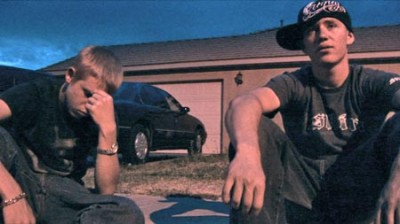| Reviews & Columns |
|
Reviews DVD TV on DVD Blu-ray 4K UHD International DVDs In Theaters Reviews by Studio Video Games Features Collector Series DVDs Easter Egg Database Interviews DVD Talk Radio Feature Articles Columns Anime Talk DVD Savant Horror DVDs The M.O.D. Squad Art House HD Talk Silent DVD
|
DVD Talk Forum |
|
|
| Resources |
|
DVD Price Search Customer Service #'s RCE Info Links |
|
Columns
|
|
|
Sons of Perdition

Reviewed at the 2010 Tribeca Film Festival
The documentary Sons of Perdition opens with the frenzied tension of a heist sequence. Two young men arrive at a middle-class home. They note that the expected cars are not in the driveway. They stroll in the front door and have a terse conversation with a girl inside. The next thing we see is items being tossed into their vehicle, and the girl's frenzied voice, imploring them to go, go, go. Later in the film, we see the full scene, and understand its context: the two young men were teens exiled from the Fundamentalist Church of Jesus Christ of Latter-Day Saints (FLDS), the polygamist sect led by convicted rape accomplice Warren Jeffs. The girl they were trying to help was the 14-year-old sister of one of the boys.
The film, directed by Tyler Measom and Jennilyn Merten, tracks with three of these young men, who have broken with the sect/cult and, as a result, are cast out of "the Crick," their hometown of Colorado City, Arizona; they are allowed no access to their families and no support of any kind. Joe is 17 years old, as is Sam; Sam's cousin Bruce is 15. We first meet them when they're two months removed from "the Crick," living 30 miles away in St. George, Utah, and while they all miss their families, they're excited to be really living their lives for the first time. In FLDS, they have no contact with the outside world and no recreation--no books, no television, no radio, no public schools, no sports, no nothing. They are allowed to work (starting at about age 14), to study scripture, and to listen to devotional messages from "the prophet." Those creepy recordings of Jeffs pontificating show up in the film, full of splendid advice to his followers (to the wives: "obey and do what Father wants").
We see and are helped to understand the way that the whole world opens up to these young men--they enjoy a drink or two, maybe more than that, and Measom and Merten keep having to identify them with on-screen text because they all keep dying their hair different colors. But they long for home; in one scene, two of the tough-talking boys, going through CDs, find what they call "Crick music," devotionals recorded by children of the sect, and as they play it they're immediately emotional, singing along without a hint of irony or sarcasm. This was their lives until mere months ago. They're still trying to cope with the fact that, according to their own parents, they're now going to hell.
Throughout the film, Joe tries several times to help his mother and sisters escape from Colorado City. He is helped by fellow exiles, and the police do what they can, but the psychological hold that "father" holds on these women cannot be broken by a couple of hours in the sun. Through the female exiles, we start to get why these young men are cast out so freely but the young women are held onto fiercely. As young teens, they are at, as far as the men in the sect are considered, prime marrying age; the older men are starting to lobby for them. They are treated "as a commodity," like "any cow in the pasture," often traded and passed around to those who tithe well in some sort of a sick caste system. With that kind of background, you can't help but feel a sense of smug satisfaction watching Joe's teenage sister at a mall salon, getting her first haircut.
There's more to say about Sons of Perdition than this kind of extended summary, but it's such a rich and compelling picture that you don't really take much notice of the unobtrusive filmmaking. There is a sequence of stunning cinematography at the beginning, beauty shots of Colorado City, gorgeous landscapes hiding the skin-crawling evil lurking underneath. But most of the film adopts an on-the-fly approach, and it works; the trust that the directors earn over the two years of shooting results in an unguarded honesty from their subjects. That's particularly true in the closing scenes, in which these under-educated but suddenly street-smart young men articulate their notions of family and what part religion can and should play in that family. In those moments, the picture really gets to you; it's a strong and weighty film, potent and powerful.
Jason lives in New York. He holds an MA in Cultural Reporting and Criticism from NYU.
|
| Popular Reviews |
| Sponsored Links |
|
|
| Sponsored Links |
|
|
| Release List | Reviews | Shop | Newsletter | Forum | DVD Giveaways | Blu-Ray | Advertise |
|
Copyright 2024 DVDTalk.com All Rights Reserved. Legal Info, Privacy Policy, Terms of Use,
Manage Preferences,
Your Privacy Choices | |||||||










